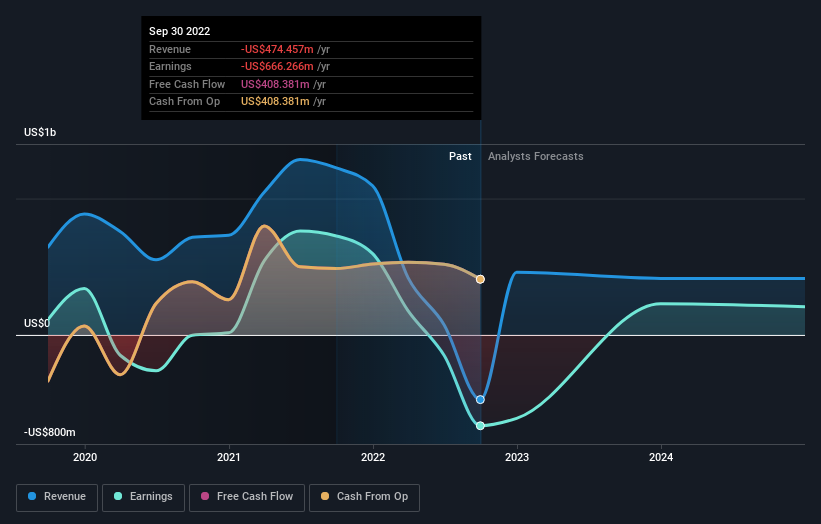- United States
- /
- Mortgage REITs
- /
- NYSE:CIM
Chimera Investment Corporation (NYSE:CIM) surges 8.8%; individual investors who own 51% shares profited along with institutions

If you want to know who really controls Chimera Investment Corporation (NYSE:CIM), then you'll have to look at the makeup of its share registry. And the group that holds the biggest piece of the pie are individual investors with 51% ownership. In other words, the group stands to gain the most (or lose the most) from their investment into the company.
Individual investors gained the most after market cap touched US$1.4b last week, while institutions who own 49% also benefitted.
Let's take a closer look to see what the different types of shareholders can tell us about Chimera Investment.
View our latest analysis for Chimera Investment

What Does The Institutional Ownership Tell Us About Chimera Investment?
Institutions typically measure themselves against a benchmark when reporting to their own investors, so they often become more enthusiastic about a stock once it's included in a major index. We would expect most companies to have some institutions on the register, especially if they are growing.
We can see that Chimera Investment does have institutional investors; and they hold a good portion of the company's stock. This implies the analysts working for those institutions have looked at the stock and they like it. But just like anyone else, they could be wrong. When multiple institutions own a stock, there's always a risk that they are in a 'crowded trade'. When such a trade goes wrong, multiple parties may compete to sell stock fast. This risk is higher in a company without a history of growth. You can see Chimera Investment's historic earnings and revenue below, but keep in mind there's always more to the story.

We note that hedge funds don't have a meaningful investment in Chimera Investment. Our data shows that The Vanguard Group, Inc. is the largest shareholder with 9.5% of shares outstanding. BlackRock, Inc. is the second largest shareholder owning 8.2% of common stock, and Thornburg Investment Management, Inc. holds about 7.5% of the company stock.
A deeper look at our ownership data shows that the top 25 shareholders collectively hold less than half of the register, suggesting a large group of small holders where no single shareholder has a majority.
Researching institutional ownership is a good way to gauge and filter a stock's expected performance. The same can be achieved by studying analyst sentiments. There are a reasonable number of analysts covering the stock, so it might be useful to find out their aggregate view on the future.
Insider Ownership Of Chimera Investment
The definition of company insiders can be subjective and does vary between jurisdictions. Our data reflects individual insiders, capturing board members at the very least. The company management answer to the board and the latter should represent the interests of shareholders. Notably, sometimes top-level managers are on the board themselves.
I generally consider insider ownership to be a good thing. However, on some occasions it makes it more difficult for other shareholders to hold the board accountable for decisions.
Our most recent data indicates that insiders own less than 1% of Chimera Investment Corporation. It's a big company, so even a small proportional interest can create alignment between the board and shareholders. In this case insiders own US$7.2m worth of shares. It is good to see board members owning shares, but it might be worth checking if those insiders have been buying.
General Public Ownership
The general public, who are usually individual investors, hold a substantial 51% stake in Chimera Investment, suggesting it is a fairly popular stock. This size of ownership gives investors from the general public some collective power. They can and probably do influence decisions on executive compensation, dividend policies and proposed business acquisitions.
Next Steps:
I find it very interesting to look at who exactly owns a company. But to truly gain insight, we need to consider other information, too. For example, we've discovered 3 warning signs for Chimera Investment (2 are concerning!) that you should be aware of before investing here.
If you would prefer discover what analysts are predicting in terms of future growth, do not miss this free report on analyst forecasts.
NB: Figures in this article are calculated using data from the last twelve months, which refer to the 12-month period ending on the last date of the month the financial statement is dated. This may not be consistent with full year annual report figures.
New: AI Stock Screener & Alerts
Our new AI Stock Screener scans the market every day to uncover opportunities.
• Dividend Powerhouses (3%+ Yield)
• Undervalued Small Caps with Insider Buying
• High growth Tech and AI Companies
Or build your own from over 50 metrics.
Have feedback on this article? Concerned about the content? Get in touch with us directly. Alternatively, email editorial-team (at) simplywallst.com.
This article by Simply Wall St is general in nature. We provide commentary based on historical data and analyst forecasts only using an unbiased methodology and our articles are not intended to be financial advice. It does not constitute a recommendation to buy or sell any stock, and does not take account of your objectives, or your financial situation. We aim to bring you long-term focused analysis driven by fundamental data. Note that our analysis may not factor in the latest price-sensitive company announcements or qualitative material. Simply Wall St has no position in any stocks mentioned.
About NYSE:CIM
Chimera Investment
Operates as a real estate investment trust (REIT) in the United States.
Proven track record average dividend payer.
Similar Companies
Market Insights
Community Narratives




